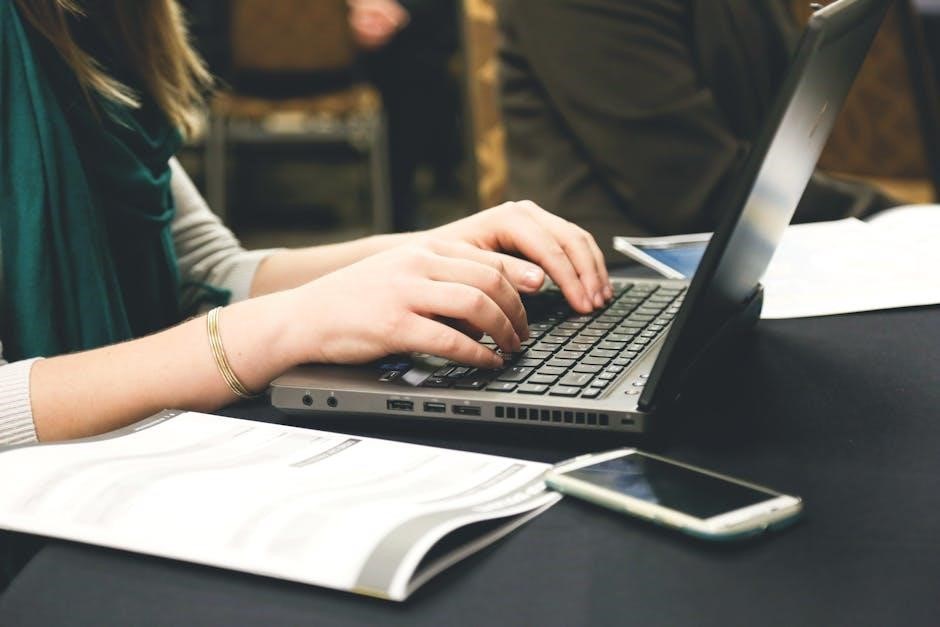The Iliad, Homer’s epic poem, explores the Trojan War’s darkest episode, centered on Achilles’ rage. Robert Fagles’ translation masterfully blends poetic grandeur with modern accessibility, preserving the original’s emotional depth while engaging contemporary readers. His work bridges ancient and modern literature, making the Iliad timeless and universally relevant.
Overview of the Iliad as a Foundational Epic Poem
The Iliad, an ancient Greek epic poem attributed to Homer, is a cornerstone of Western literature. It recounts a pivotal moment in the Trojan War, focusing on Achilles’ rage and its devastating consequences. The poem explores themes of honor, pride, and mortality, set against the backdrop of divine intervention. Its structured dactylic hexameter and rich imagery have influenced countless literary works. As a foundational text, the Iliad continues to resonate, offering insights into human nature and the complexities of war. Robert Fagles’ translation captures its grandeur while making it accessible to modern readers, ensuring its timeless relevance.
Robert Fagles, a renowned scholar and translator, brought Homer’s Iliad to life for modern audiences with his lyrical and accessible translation. Unlike earlier versions, Fagles prioritized emotional intensity and vivid imagery over strict meter, creating a fluid narrative. His work maintains the epic’s grandeur while connecting with contemporary readers. Fagles’ translation, accompanied by Bernard Knox’s insightful introduction and notes, has become a standard in classical literature, balancing fidelity to the original with a fresh, poetic voice. His contribution has ensured the Iliad’s enduring legacy, making it a vital resource for both scholars and general readers. Fagles’ mastery is evident in his ability to bridge ancient and modern, preserving the epic’s essence. Robert Fagles, a Princeton University professor emeritus, was renowned for his poetic and accessible translations of classical epics. His Iliad translation blends modern sensibility with ancient grandeur. Robert Fagles was the Arthur W. Marks ’19 Professor of Comparative Literature, Emeritus, at Princeton University. A renowned scholar, he received the 1997 PEN/Ralph Manheim Medal for Translation and a 1996 Academy Award in Literature. Fagles’ translations of classical epics, including the Iliad, Odyssey, and Aeneid, are celebrated for their poetic depth and accessibility. His work bridges ancient and modern literature, making classical texts resonate with contemporary audiences. Fagles’ contributions have significantly influenced modern scholarship and education, ensuring the timeless relevance of Homer’s epic poetry. Robert Fagles’ translation of the Iliad is distinguished by its powerful, poetic style, blending modern sensibility with the grandeur of Homer’s original text. Unlike strict, metered translations, Fagles emphasizes fluidity and accessibility, capturing the emotional intensity and vivid imagery of the epic. His use of free verse allows the narrative to flow naturally, making the ancient tale resonate with contemporary readers. The translation maintains the epic’s grandeur while ensuring its themes of human struggle and divine intervention remain relatable. Fagles’ approach has been praised for its ability to convey both the complexity and beauty of Homer’s work, making the Iliad accessible to a broad audience without compromising its poetic essence. The Iliad is an ancient Greek epic poem, traditionally attributed to Homer, focusing on the Trojan War and Achilles’ wrath. Composed around 8th–7th century B.C., it is structured into 24 books, each detailing key events and themes, exploring human emotions, divine interventions, and the futility of war. The Iliad is set during the Trojan War, a conflict between the city-states of Troy and Greece, traditionally dated around 1200 B.C. Its composition, however, is believed to have occurred much later, with modern scholars placing it in the late 8th or early 7th century B.C. This oral epic was likely passed down through generations before being written, blending historical events with mythological elements. The poem reflects the cultural and social values of ancient Greece, while its historical accuracy remains debated. Robert Fagles’ translation captures the epic’s timeless essence, preserving its historical and literary significance for modern readers. The Iliad delves into profound themes such as honor, rage, mortality, and the human condition, set against the backdrop of the Trojan War. Achilles’ wrath drives the narrative, exploring the complexities of heroism and the devastating consequences of unchecked emotion. The poem also examines the duality of war’s glory and its brutal reality, offering a nuanced portrayal of both divine and human perspectives. Robert Fagles’ translation enhances the emotional depth, rendering the characters’ struggles and vulnerabilities with vivid clarity. This epic not only recounts events but also probes the universal human experiences of loss, pride, and the search for meaning in a chaotic world. Robert Fagles’ translation of the Iliad received widespread acclaim for its poetic brilliance and accessibility. It has become a cornerstone in both scholarly and popular circles, influencing modern scholarship and education while captivating readers worldwide with its vivid storytelling and emotional depth. Robert Fagles’ translation of the Iliad garnered widespread critical acclaim for its masterful blend of poetic beauty and fidelity to Homer’s original text. Scholars praised its ability to capture the emotional intensity and vivid imagery of the epic while making it accessible to modern readers. The translation has been celebrated for its fluid, natural language, which avoids the rigidity of strict meter without losing the grandeur of the source material. Its popularity extends beyond academia, appealing to a broad audience and solidifying its place as a definitive interpretation of Homer’s work. Fagles’ contribution has been instrumental in reintroducing the Iliad to contemporary readers. Robert Fagles’ translation of the Iliad has become a cornerstone in modern scholarship and education, widely adopted in universities and classrooms worldwide. Its clear, poetic language makes it accessible to students while maintaining the epic’s emotional and intellectual depth. Scholars often cite its fidelity to Homer’s original themes and its ability to convey complex ideas with modern sensibility. Fagles’ work is frequently referenced in academic studies and is a preferred text for teaching ancient literature due to its balance of readability and scholarly rigor. Additionally, his translation is featured in educational resources, such as SparkNotes, further cementing its role in educational curricula. The Iliad translated by Robert Fagles is widely available in PDF format through legitimate sources like universities, online archives, and digital bookstores, ensuring easy access for readers worldwide. Legitimate sources for downloading the PDF of Robert Fagles’ translation of the Iliad include academic institutions, digital libraries like the Internet Archive, and reputable online bookstores. These platforms ensure legal access to the text, supporting both educational purposes and personal reading. Additionally, some universities and libraries offer free access to the PDF through their portals, promoting scholarly engagement with Homer’s epic. Always prioritize verified sources to respect copyright and support the work of translators and publishers like Penguin Classics, which has widely distributed Fagles’ acclaimed translation. Accessing Robert Fagles’ translation of the Iliad in PDF format requires adherence to copyright laws and ethical standards; Downloading from unauthorized sites violates intellectual property rights and undermines the work of authors and publishers. Legal alternatives include purchasing the eBook from reputable retailers like Amazon or accessing it through academic databases and libraries. Ethical considerations emphasize respecting the efforts of translators and copyright holders. Ensuring that access is lawful supports the sustainability of literary works and maintains the integrity of scholarly and creative endeavors. The Iliad, through Robert Fagles’ masterful translation, remains a timeless epic, bridging ancient and modern worlds. Fagles’ work ensures the poem’s enduring relevance and emotional resonance. The Iliad’s enduring legacy lies in its universal themes of human emotion, honor, and conflict, transcending time and culture. Robert Fagles’ translation has revitalized Homer’s epic for modern readers, blending poetic elegance with accessibility. His work ensures the Iliad’s relevance in contemporary literature and education, making ancient Greek epic poetry resonate with new generations. Fagles’ contribution is celebrated for its ability to preserve the original’s grandeur while offering a fresh, engaging interpretation. As a result, his translation remains a cornerstone in classical studies and a testament to the timeless appeal of the Iliad.Robert Fagles’ Role in Translating the Iliad

Background of Robert Fagles and His Translation Style
Fagles’ Academic Credentials and Contributions to Classical Literature
Key Features of Fagles’ Translation: Poetic Style and Accessibility

Structure and Composition of the Iliad
Historical Context and Dating of the Iliad
Major Themes and Emotional Depth in the Iliad

Reception and Impact of Fagles’ Translation
Critical Acclaim and Popular Reception of the Translation
Fagles’ Translation in Modern Scholarship and Education

Availability of the Iliad (Fagles Translation) in PDF Format
Legitimate Sources for Downloading the PDF
Legal and Ethical Considerations for Accessing the PDF
The Enduring Legacy of the Iliad and Fagles’ Contribution






